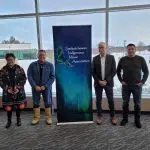Argentines try to understand why the pope won’t return home
SANTIAGO, Chile — Pope Francis has flown over the massive Andes cordillera, visited the poor in several slums and rubbed shoulders with presidents in six visits to Latin America. But in five years as pope, he has never returned home to Argentina.
Resigned to that reality, tens of thousands of Argentines travelled to Chile this week to see Francis next door, some frustrated with his stubborn refusal and others assuming he must have his reasons.
“Argentines often ask themselves, ‘Why doesn’t he want to go home?’” said Sonia Fonseca, a housewife who came to Santiago to see Francis. “Apparently he doesn’t want to.”
“Argentines are behaving badly,” mused Gilberto Madriago, another Argentine who travelled to Santiago for the visit. “He is punishing us for sure.”


